Unit 1: 객체 지향 프로그래밍이란?
- Chapter 1: 객체 지향 프로그래밍 시작하기
- Chapter 2: 객체를 만드는 법
- Chapter 3: 미리 알고가야 할 것들
- Chapter 4: 객체 만들기 연습
- Chapter 5: 객체 지향 프로그래밍 직접 해보기
Chapter 1: 객체 지향 프로그래밍 시작하기
객체란?
- '속성'과 '행동'으로 이루어진 것.
- 예: 자동차는 바퀴 4개, 색깔, 의자, 핸들 등의 속성과 전진, 후진 등의 행동을 가진 객체
- '속성'과 '행동'을 떠올릴 수 있는 것이라면, 그것이 현실에 존재하던 가상에 존재하던 모두 객가 될 수 있다.
- 파이썬에서 속성은 변수로, 행동은 함수로 나타낸다.
객체지향 프로그래밍이란?
: 프로그램을 여러 개의 독립된 객체들과 그 객체들 간의 상호작용으로 파악하는 프로그래밍 접근법이다.
: 프로그램을 객체들 간의 소통으로 바라보는 것.
객체 지향 프로그래밍으로 프로그램을 만들려면?
- 프로그램에 어떤 객체들이 필요할지 정한다.
- 객체들의 속성과 행동을 정한다.
- 객체들이 서로 어떻게 소통할지 정한다.
Chapter 2: 객체를 만드는 법
인스턴스 변수 정의하기
- 인스턴스 이름.속성이름(인스턴스 변수) = "속성값"
예시
class User:
pass
user1.name = "김"
user1.email = "kim@gmail.com"
user2.name = "이"
user2.email = "lee@gmail.com"인스턴스 메서드 정의하기
예시
class User:
def say_hello(some_user):
print(f"안녕, 나는 {some_user.name}이야!")
pass
user1.name = "김"
user1.email = "kim@gmail.com"
user2.name = "이"
user2.email = "lee@gmail.com"
User.say_hello(user1) # 클래스에서 메서드 호출
user1.say_hello() # 인스턴스에서 메서드 호출
결과:
안녕, 나는 김이야!
안녕, 나는 김이야!user1.say_hello()에 user1을 인자로 넘기지 않아도 호출이 된다.
넘기는 순간 에러가 발생한다.
인스턴스가 메서드를 호출할 때는 자기 자신이 첫 번째 인자로 넘어간다!
self를 사용하자.
인스턴스가 메서드를 호출할 때는 자기 자신이 첫 번째 인자로 넘어간다!
이를 명시해주기 위해 파이썬에서는 인스턴스 메서드의 첫 파라미터로 "self"를 사용한다.
이렇게 안해도 에러가 나는건 아니지만, 이건 파이썬 쓰는 사람들끼리의 규칙이다.
__init__
- 언더바 두개에 쌓여있는 메서드를 magic method, 특수 메소드라고 부른다.
- magic method는 특정 상황에서 자동으로 호출되는 메소드다.
__init__메서드는 클래스 생성시 자동으로 호출된다.
class User:
def initialize(self, name, email):
self.name = name
self.email = email
user1 = User()
user1.initialize("김코딩", "hi@gmail.com")__init__메서드 없이는 객체 속성을 지정하기 위해 위처럼 해야한다.
__init__메서드는 객체를 생성할 때 인자를 넘겨주면 되므로 훨씬 간다해진다.
아래 예시를 보자.
class User:
def __init__(self, name, email):
self.name = name
self.email = email
user1 = User("김코딩", "kim@gmail.com")user1 = User("김코딩", "kim@gmail.com") 요 코드 한 줄이 실행되면 1) User의 인스턴스 하나가 생성됨 2) init메서드가 호출됨 한 번에 객체를 생성하고 속성을 지정해줄 수 있다는 장점 때문에 보통 클래스를 만들땐 항상init`메서드가 같이 호출된다.
__str__
위 코드에서 print(user1)을 해보면 <__main__.User object at 0x7fc9ab5c9670>이런 값이 나온다.
인스턴스를 프린트 했을 때 원하는 값이 나오게 하려면 __str__을 오버라이드 하면 된다.
class User:
def __init__(self, name, email):
self.name = name
self.email = email
def __str__(self):
return self.name
user1 = User("김코딩", "kim@gmail.com")
print(user1)
결과: 김코딩클래스 변수
-클래스 변수는 class 정의 부분 바로 아래 변수를 정의해주면 된다.
예시를 보자.
class User:
count = 0
def __init__(self, name, email):
self.name = name
self.email = email
def __str__(self):
return self.name
User.count = 1
print(User.count)
결과: 1- 그렇다면 count변수가 User인스턴스의 총 개수 품게 하려면 어떠게 할까?
- User인스턴스가 생성될 때 마다 count +=1을 해주면 된다.
- User인스턴스가 생성될 때마다
__init__메서드가 호출되므로 거기에 더해주면 된다.
class User:
count = 0
def __init__(self, name, email):
self.name = name
self.email = email
User.count += 1
def __str__(self):
return self.name
user1 = User("김", "kim@gmail.com")
user2 = User("이", "lee@gmail.com")
user3 = User("박", "park@gmail.com")
print(User.count)
결과: 3클래스 변수를 출력하고 할당하는 방법에 대해 좀 더 살펴보자.
...생략....
user1 = User("김", "kim@gmail.com")
user2 = User("이", "lee@gmail.com")
user3 = User("박", "park@gmail.com")
user2.count = 10
print(User.count)
print(user1.count)
print(user2.count)
print(user3.count)
결과
3
3
10
3- user2.count를 새로 정의한 부분때문에 그것만 10값이 나왔다.
- 그런데 user2.count=10은 인스턴스 변수를 할당해준 것이지, 클래스 변수를 할당한게 아니다.
- 즉 같은 이름을 가진 클래스 변수와 인스턴스 변수가 존재하는 것이고, 이때는 인스턴스 변수가 선행한다.
- 결론: 클래스 변수와 같은 이름의 인스턴스 변수는 만들지 않는다!
데코레이터
: 함수를 인자로 받아 꾸며진 함수를 리턴하는 함수
def print_hello():
print("안녕")
def add_print_to(original):
def wrapper():
print("함수 시작")
original()
print("함수 끝")
return wrapper
add_print_to(print_hello)()
결과값
함수 시작
안녕
함수 끝- 어떤 함수를 데코레이터 함수에 넣으려면 @를 사용하면 된다.
def add_print_to(original):
def wrapper():
print("함수 시작")
original()
print("함수 끝")
return wrapper
@add_print_to
def print_hello():
print("안녕")
print_hello()
결과값
함수 시작
안녕
함수 끝클래스 메소드
- 클래스 메소드는 메소드 위에 @classmethod 데코레이터를 달아주면 된다.
- 클래스 메소드 첫 인자는 self가 아닌 cls를 사용한다. (약속임. 안한다고 에러가 나진 않지만)
- 클래스 메소드는 클래스를 통해 호출할 수도 있고, 인스턴스를 통해 할 수도 있다.
class User:
count = 0
def __init__(self, name, email):
self.name = name
self.email = email
User.count += 1
def __str__(self):
return self.name
@classmethod
def number_of_users(cls):
print(f"총 유저수는 {cls.count}입니다.")
user1 = User("김", "kim@gmail.com")
user2 = User("이", "lee@gmail.com")
user3 = User("박", "park@gmail.com")
User.number_of_users() # 클래스를 통해 클래스 메서드 호출
user1.number_of_users() # 인스턴스를 통해 클래스 메서드 호출
결과
총 유저수는 3입니다.
총 유저수는 3입니다.인스턴스 메소드 vs 클래스 메소드
- 인스턴스 메소드:
User.say_hello(user1)또는user1.say_hello() - 클래스 메소드:
User.number_of_users()또는user1.number_of_users() - 클래스 메소드는 클래스가 첫 인자로 자동 전달된다.
- 이렇게 될 수 있는 이유는 @classmethod 데코레이터 떄문이다.
언제 각 메소드를 사용해야 할까?
- 위에서 정의한 classmethod는 사실 instance method 만들어도 문제는 없다.
- 언제 어떤 메소드를 쓰냐의 기준은 어떤 변수를 쓰냐에 달렸다.
- 클래스 변수를 사용한다면 클래스 메서드, 인스턴스 변수를 사용한다면 인스턴스 메서드를 사용하자.
- 만약 클래스 변수, 인스턴스 변수 둘 다 사용한다면 -> 인스턴스 메소드를 사용해라!
- 인스턴스 메서드는 인스턴스, 클래스 변수 둘 다 사용 가능하지만, 클래스 메서드는 인스턴스 변수를 사용 못하기 때문.
- 인스턴스가 하나도 없을 때에도 사용될 가능성이 있는 메서드라면 클래스 메서드를 사용하자!
정적 메소드(static method)
- 인스턴스 변수나 클래스 변수 중 아무것도 사용하지 않을 때 static method사용.
- static method는 첫 인자로 self, cls 중 어느것도 자동으로 넘어가지 않는다.
...생략...
@staticmethod
def is_valid_email(email_address):
return "@" in email_address
user1 = User("김", "kim@gmail.com")
user2 = User("이", "lee@gmail.com")
user3 = User("박", "park@gmail.com")
print(User.is_valid_email("email")) # 클래스를 통해 클래스 메서드 호출
print(user1.is_valid_email("email@email.com"))
결과값
False
TrueChapter 3: 미리 알고가야 할 것들
1) 파이썬은 순수 객체 지향 언어다 = 모든 것이 객체다
print(type(1))
print(type("a"))
print(type([]))
print(type({}))
print(type(()))
결과값
<class 'int'>
<class 'str'>
<class 'list'>
<class 'dict'>
<class 'tuple'>파이썬은 모든 것이 클래스이다.
2) 파이썬 가변 타입 vs 불변타입
- 직접 작성하는 클래스는 가변타입이다.
- 내장 클래스 가변/불변 여부
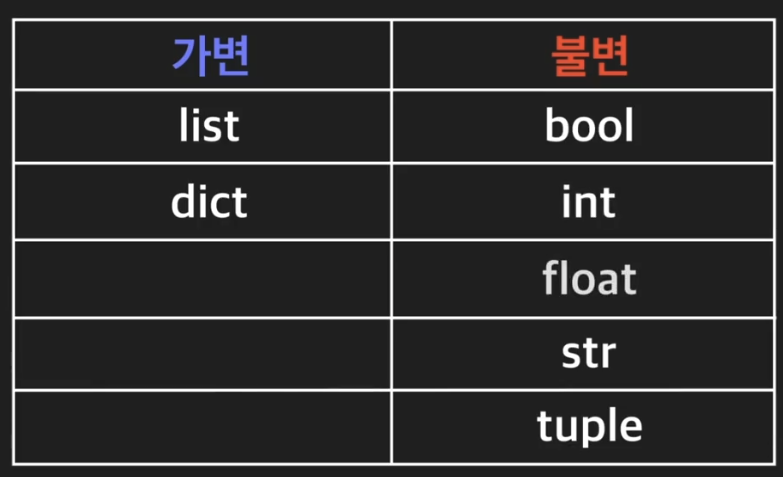
3) 절차지향 vs 객체지향
- 객체지향 개념이 등장하기 이전에 절차지향이있었다.
- 절차지향에는 객체 개념이 없는 대신 '함수'개념이 쓰인다.
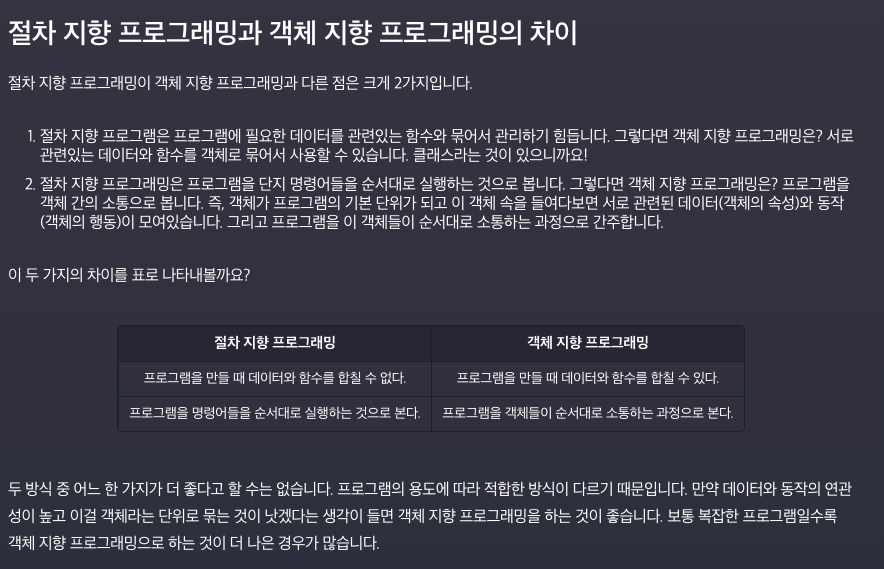
4) tenary expression
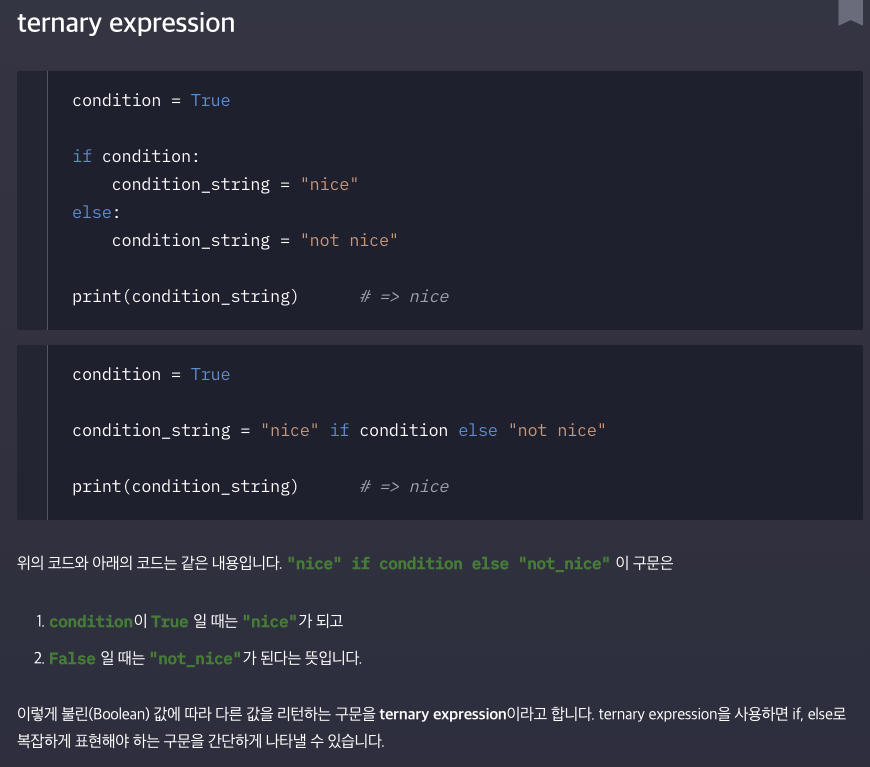
5) zfill method
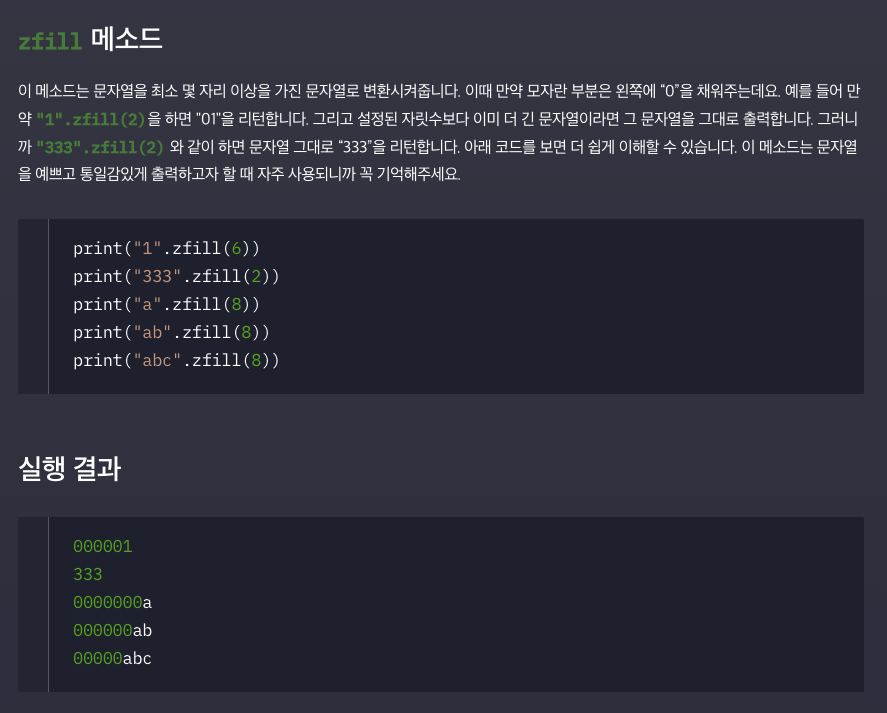
Chapter 4: 객체 만들기 연습
Chapter 5: 객체 지향 프로그래밍 직접 해보기
Unit 2: 객체 지향 프로그래밍의 4가지 기둥
- Chapter 1: 추상화(Abstraction)
- Chapter 2: 캡슐화(Encapsulation)
- Chapter 3: 상속(Inheritance)
- Chapter 4: 다형성(Polymorphism
Chapter 1: 추상화(Abstraction)
추상화란?
- 특정 코드를 사용할 때 필수적인 정보를 제외한 세부사항을 가리는 것.
- 커피 머신 내부 작동 원리를 몰라도 커피 머신을 쓸 수 있다. 이게 추상화의 원리
- 변수에 값을 할당하는 것도 추상화다.
- 함수를 사용하는 것도 추상화다.
- 클래스를 사용하는 것도 추상화다.
- 예를 들어 list.append(값) 뒷단에서 돌아가는 클래스 내부 로직을 몰라서 append를 사용할 수 있다.
추상화를 잘 하려면 이름을 잘 지어야 한다!
- 변수명에 의미를 잘 담아 짓자.
추상화를 잘 하려면 문서화를 잘 해야 한다.
- 변수명 잘짓기에도 한계가 있으니 docstring(문서화 문자열)을 잘 활용하자.
-help(class_name)을 사용하면 해당 클래스의 모든 docstring이 출력된다. - 예: help(list)
docstring 스타일 3개
1). Google docstring
"""유저에게 추천할 영상을 찾아준다
Parameters:
number_of_suggestions (int): 추천하고 싶은 영상 수
(기본값은 5)
Returns:
list: 추천할 영상 주소가 담긴 리스트
"""2). ReStructuredText(파이썬 공식 문서화 기준)
"""유저에게 추천할 영상을 찾아준다
:param number_of_suggestions: 추천하고 싶은 영상 수
(기본값은 5)
:type number_of_suggestions: int
:returns: 추천할 영상 주소가 담긴 리스트
:rtype: list
"""3). NumPy/SciPy (통계, 과학 분야에서 쓰이는 Python 라이브러리)
"""유저에게 추천할 영상을 찾아준다
Parameters
----------
number_of_suggestions: int
추천하고 싶은 영상 수 (기본값은 5)
Returns
-------
list
추천할 영상 주소가 담긴 리스트
"""파이썬은 동적 타입 언어이다.
- type 지정을 해주지 않아도 된다.
- 반대 말인 정적 타입 언어는 변수를 선언할 꼭 타입을 지정해주어야 한다.때
type hinting
- 무슨 타입인지 설명해주는 코드를 작성할 수 있다.
- 방법은
변수명: type명이다. - 예시: name: str = "kim"
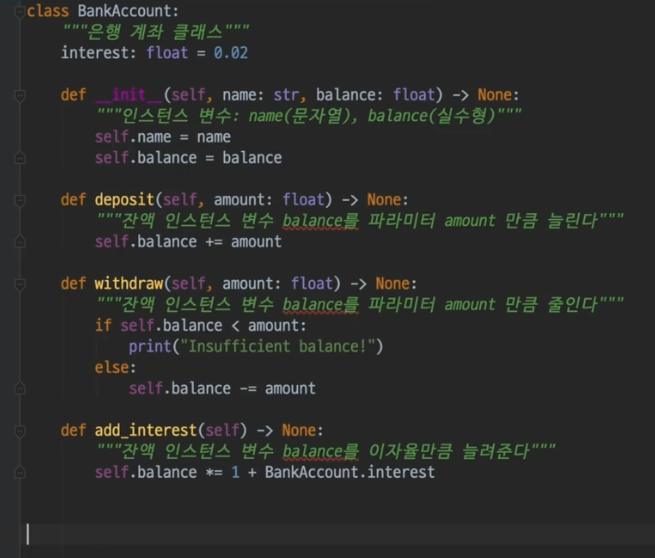
- type hinting대로 작성하지 않아도 에러가 나진 않는다.
- python 3.5 이후부터만 사용 가능.
Chapter 2: 캡슐화(Encapsulation)
캡슐화 정의
- 객체의 일부 구현 내용에 대한 외부로부터의 직접적인 액세스를 차단하는 것.
- 객체의 속성과 그것을 사용하는 행동을 하나로 묶는 것.
외부 접근 차단하는 법:
- 변수나 메서드 이름 앞에 언더바 두개('__')를 붙여준다.
class Citizen:
"""주민 클래스"""
drinking_age = 19 # 음주 가능 나이
def __init__(self, name, age, resident_id):
"""이름, 나이, 주민등록번호"""
self.name = name
self.set_age(age)
self.__resident_id = resident_id
def authenticate(self, id_field):
"""본인이 맞는지 확인하는 메소드"""
return self.__resident_id == id_field
def can_drink(self):
"""음주 가능 나이인지 확인하는 메소드"""
return self.__age >= Citizen.drinking_age
def __str__(self):
"""주민 정보를 문자열로 리턴하는 메소드"""
return self.name + "씨는 " + str(self.__age) + "살입니다!"
def get_age(self):
"""숨겨 놓은 인스턴스 변수 __age의 값을 받아오는 메소드"""
return self.__age
def set_age(self, value):
"""숨겨 놓은 인스턴스 변수 __age의 값을 설정하는 메소드"""
if value < 0:
print("나이는 0보다 작을 수 없습니다. 기본 값 0으로 나이를 설정하겠습니다")
self.__age = 0
else:
self.__age = value
# 주민 인스턴스 생성
young = Citizen("younghoon kang", 18, "87654321")
print(young.__str__()) # 출력: younghoon kang씨는 18살입니다!
print(young.__authenticate("87654321")) # 에러가 난다!!!__가 붙은 변수에 접근하는 메서드
- can_drink메서드는 self.__age를 사용한다.
- 이처럼 __가 붙은 변수는 외부에서 사용 불가능하지만, 내부 메서드에선 접근이 가능하다.
- 이것이 바로 캡슐화의 두 번쨰 정의인 "객체의 속성과 그것을 사용하는 행동을 하나로 묶는 것." 에 해당하는 내용이다.
getter, setter
캡술화된 변수의 값을 읽어주는 메서드는 getter, 할당해 주는 메서드를 setter라고 한다.
캡슐화 정리
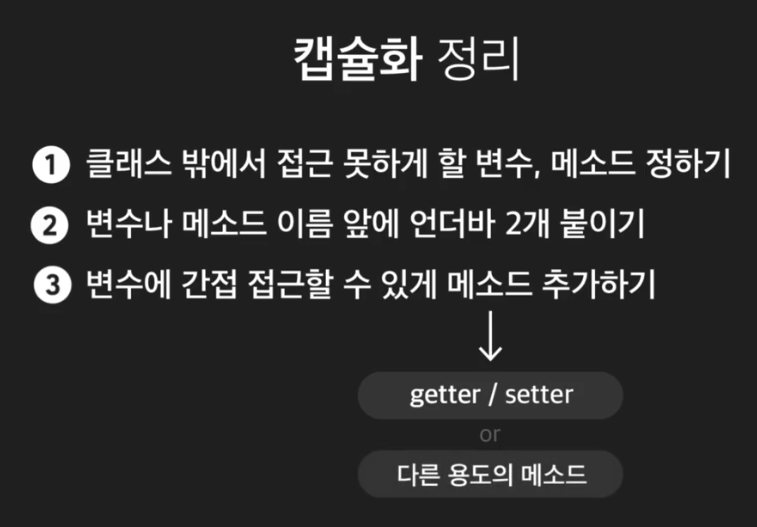
파이썬의 캡슐화와 캡슐화 문화
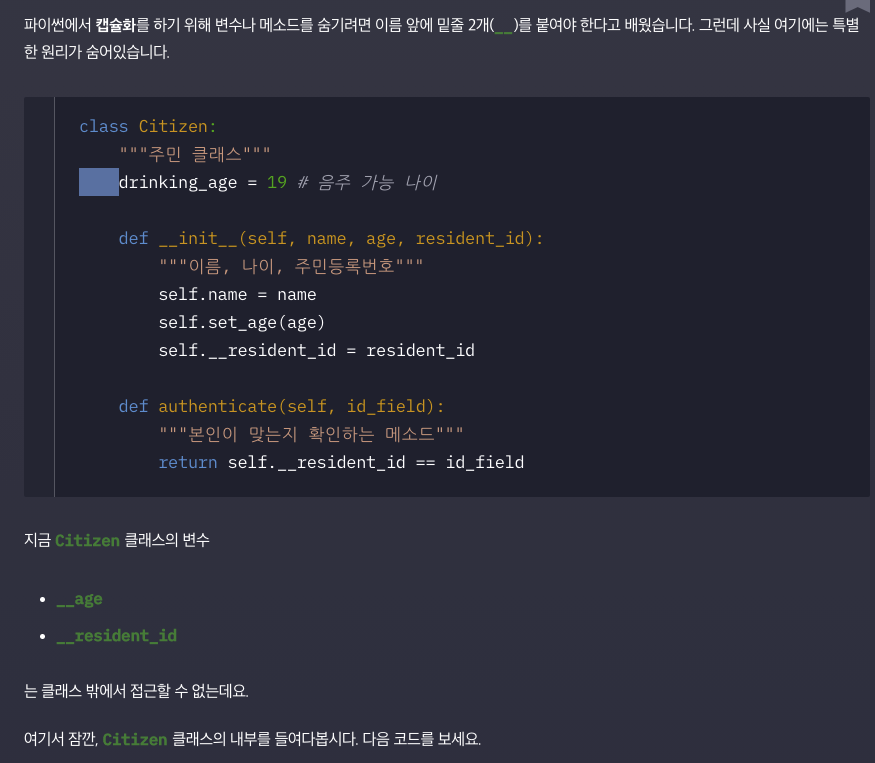
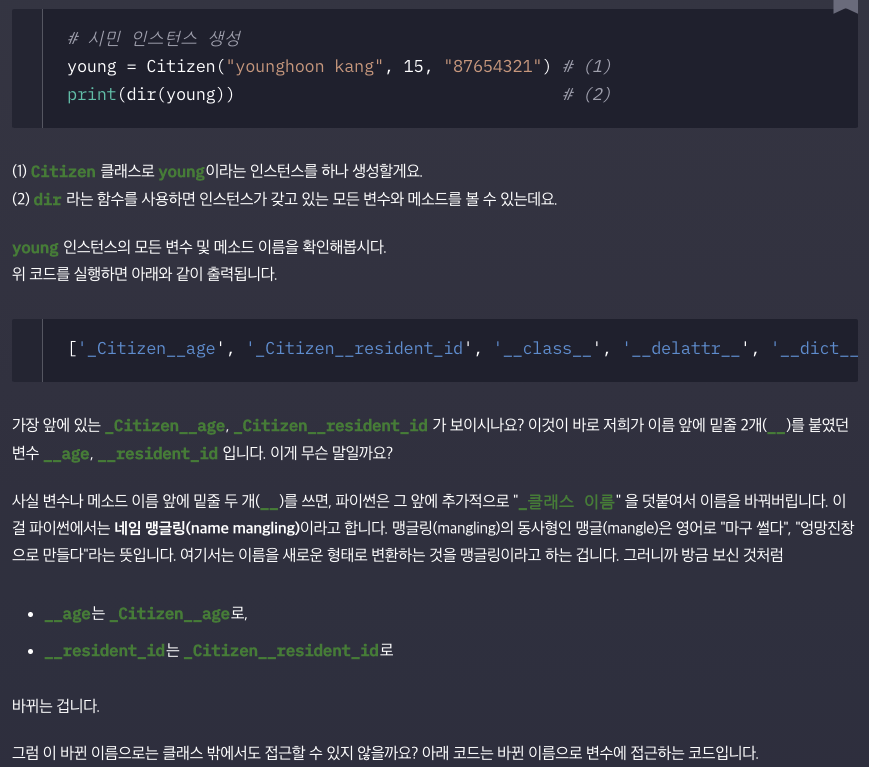
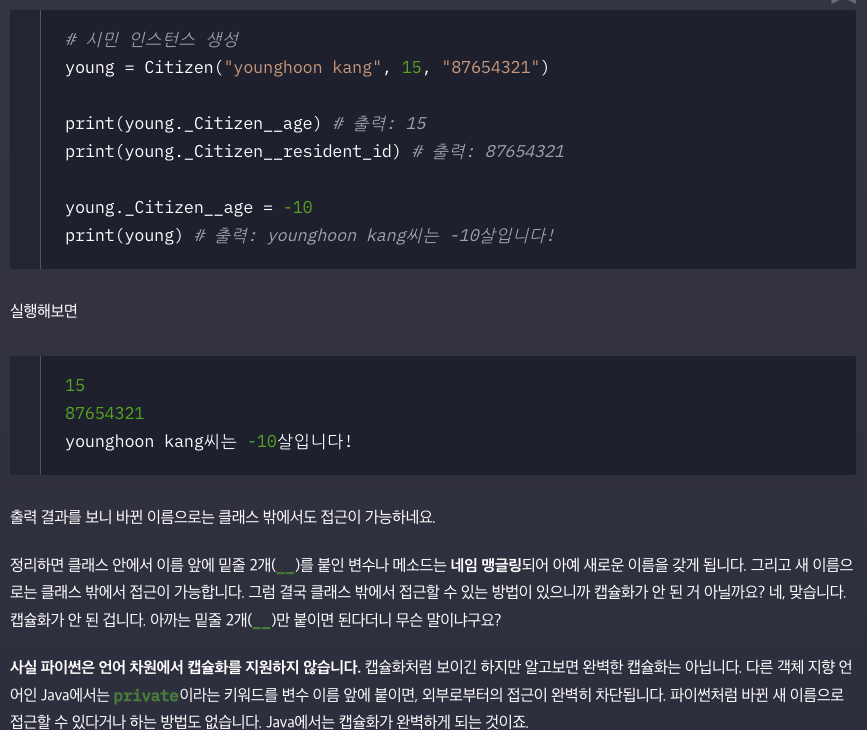

파이썬의 캡슐화 약속: _한개
- 파이썬 개발자들은 캡슐화를 위해 변수나 메소드 앞에 언더바를 하나만 붙인다.
- 이렇게 하면 외부에서 해당 데이터에 직접 접근하지 말라는 경고다.
- 물론 언더바 하나 더한 것 자체는 어떤 기능도 없다. 그냥 서로에게 주는 싸인일 뿐이다.
- 여하튼 앞으로 캡슐화르 할 땐 언더바 하나를 앞에 붙이자. 결론!
@property, @age.setter
- 클래스에 _age라는 변수가 있다 치자.
- 이 변수는 캡슐화되어 외부에서 접근하지 말라는 뜻을 담고 있다.
- 이 변수의 getter, setter 메서드를 @property, @age.setter를 통해 만들 수 있다.
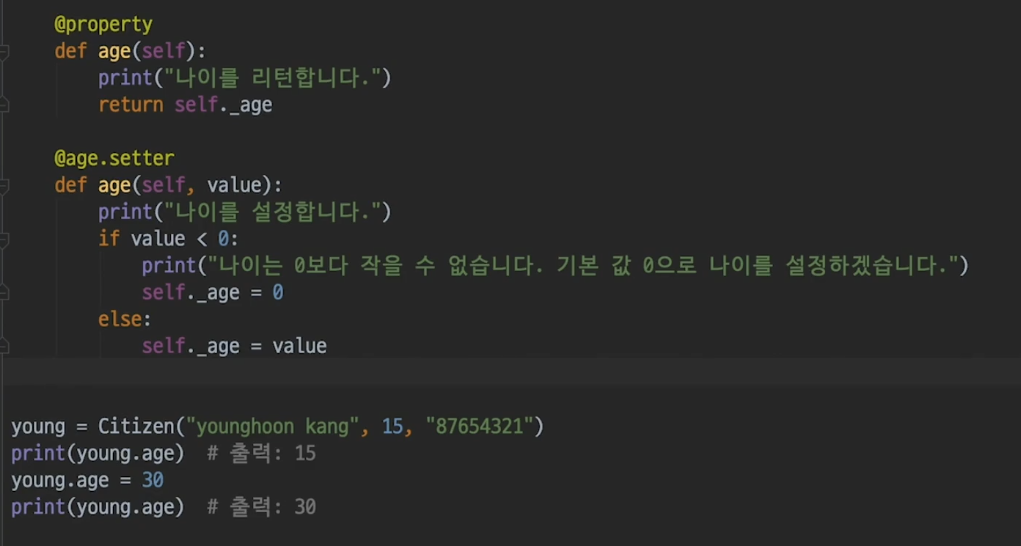
- 이 데코레이터를 통해 실제 _age를 사용할 때 age라고 쓰면서 사용할 수 있다.
- 예시 코드에서
print(young.age)이 실행되면 데코레이터에 덕에 @property가 달려있는 age 메서드(getter)가 실행된다. - 예시 코드에서
young.age = 30이 실행되면 데코레이터 덕에 @age.setter가 자동으로 실행된다. - 즉, _변수명의 변수가 있을 경우 변수명으로 함수를 만들고 그 위에 @property, @변수명.setter를 만들어주면 된다.
객체를 사용할 땐 최대한 메소드로
- 변수에 직접 접근하는 코드가 많을수록 유지보수 하기가 어렵다.
- 메서드로 변수에 접근하고, 그 메서드를 다른데서 가져가 쓰는 것이 제일 좋다.
Chapter 3: 상속(Inheritance)
1) 상속이란?
- 두 클래스 사이에 부모-자식 관계를 설정하는 것.
- 벤츠-자동차 관계에서 벤츠는 자동차지만 자동차는 벤츠가 아니다.
- 자동차는 벤츠의 부모다.
- 벤츠는 자동차를 상속받는다.
- 상속은 반복을 줄여준다.
2) mro, isinstance, issubclass 함수
mro(Method resolution order)
- mro함수는 어떤 클래스의 상속 관계를 보여준다.
- 아래 결과를 보면 Son -> Mom -> object로 가는 상속 관계를 보여준다.
- object는 보다시피 모든 클래스의 조상이다.
- 참고로 help(class_name)으로도 상속 관계를 볼 수 있다.
class Mom:
pass
class Son(Mom):
pass
print(Son.mro())
결과값:
[<class '__main__.Son'>, <class '__main__.Mom'>, <class 'object'>]isinstance
- 이 함수는 어떤 인스턴스가 주어진 클래스의 인스턴스인지 알려준다.
- 첫 파라미터로 검사할 인스턴스 이름,
- 두 번째 파라미터로 기준 클래스의 이름을 넘겨준다.을
- 리턴값은 Boolean
class Mom:
pass
class Son(Mom):
pass
son = Son()
print(isinstance(son, Mom))
print(isinstance(son, object))
print(isinstance(son, list))
결과값:
True
True
Falseissubclass
- 어떤 클래스가 다른 클래스의 자식 클래스인지 알려주는 함수다.
- 첫 번째 파라미터로 검사할 클래스의 이름을,
- 두 번째 파라미터로 기준이 되는 클래스의 이름을 넘겨준다.
- 리턴값은 Boolean
class Mom:
pass
class Son(Mom):
pass
son = Son()
print(issubclass(Son, Mom))
print(issubclass(Son, object))
print(issubclass(Son, list))
결과값:
True
True
False3) overring
- 부모의 변수를 오버라이드 하려면 똑같은 변수명으로 오버라이드 하면 된다. (아래의 DeliveryMan의 raise_percentage처럼)
- super().
__init__(똑같은 인자 념겨주기)로 상속을 명시할 수 있다. (이렇게 안해도 자동으로 상속은 된다.)
class Employee:
"""직원 클래스"""
company_name = "코드잇 버거"
raise_percentage = 1.03
def __init__(self, name, wage):
"""인스턴스 변수 설정"""
self.name = name
self.wage = wage
class DeliveryMan(Employee):
"""배달원 클래스"""
raise_percentage = 1.1
def __init__(self, name, wage, on_standby):
super().__init__(name, wage)
self.on_standby = on_standby
상속의 원리
- 부모와 자식이 같은 이름의 메서드를 갖고 있다면 mro에서 제일 빠른 순번의 것이 먼저 호출된다.
- 즉 자식에서 오버라이딩 한 메서드가 호출된다. 이런 원리를 통해서 오버라이딩이 가능한 것이다.
4) 다중상속
파이썬은 다중상속이 가능하다 (Java같은 언어는 상속 딱 하나만 가능)
방법
- 아래 예시의 C 클래스는 A, B를 다중상속 받았다.
class A:
def __init__(self, a):
self.a = a
class B:
def __init__(self, b):
self.b = b
class C(A, B):- 그런데 만약 C에서
super().__init__을 실행하면 A, B 중 어떤 클래스의 메서드가 실행되는 걸까? - 이런 점이 모호 하기 때문에 다중상속의 경우 super대신 부모 클래스의 이름을 명시해주거나 메소드 자체를 오버라이드 한다.
- 부모 클래스의 이름을 명시해주는 예제
class C(A, B):
def __init__(self, a, b):
A.__init__(self, a)
B.__init__(self, b)
- 메소드 오버라이드 하는 예시
class C(A, B):
def __init__(self, a, b):
self.a = a
self.b = b
- 다중상속은 위험한 면이 있다. 그래서 어떤 언어들은 다중상속 자체를 지원 안한다.
- 이런 위험성을 해결하기 위해 아래 두가지 솔루션을 제시한다.
다중상속 문제 해결 솔루션
- 부모클래스끼리 같은 이름의 메소드 갖지 않기
- 같은 이름의 메소드는 자식클래스에서 오라이딩
Chapter 4: 다형성(Polymorphism)
Unit 3: 견고한 객체 지향 프로그래밍: SOLID 원칙
목차
- Chapter 1: 단일 책임 원칙 (Single Responsibility Principle)
- Chapter 2: 개방 폐쇄 원칙 (Open-closed Principle)
- Chapter 3: 리스코프 치환 원칙 (Liskov Substitution Principle)
- Chapter 4: 인터페이스 분리 원칙 (Interface Segregation Principle)
- Chapter 5: 의존 관계 역전 원칙 (Dependency Inversion Principle)차
개요
- SOLID원칙은 Robert C. Martin이라는 유명한 개발자가 2000년도에 처음 소개한 객체 설계의 기본 원칙이다.
- 객체 지향 프로그래밍에서 사실상 표준 규칙처럼 알려져 있다.
Chapter 1: 단일 책임 원칙 (Single Responsibility Principle)
정의: 모든 클래스는 단 한가지의 책임만 갖고, 클래스 안에 정의되어 있는 모든 기능은 이 하나의 책임을 수행하는데 집중되어 있어야 한다.
- 하나의 클래스로 너무 많은 일을 하지 말라는 뜻임.
- 물론 어디까지가 한 가지 책임이라고 할 수 있는지는, 사람들마다 생각이 다르고, 상황에 따라서도 다르다.
- 같이 수정해야 할 것들은 묶고, 따로 수정해야 하는 것들은 분리하기.
- 중요한 것은 코드를 작성할 때, 내가 단일 책임 원칙을 지키고 있는지 신경쓰는 것
- 너무 많은 기능을 수행하는 클래스는 GOD Object라고 하기도 한다(물론 안좋은 뜻이다.)
- 아래 Ship클래스가 그 예시다. 연료, 물자, 선원, 엔진 이 모든 것을 책임지는 클래스다보니 너무 크고 유지보수가 어렵다.
class Ship:
"""배 클래스"""
def __init__(self, fuel, fuel_per_hour, supplies, num_crew):
"""연료량, 시간당 연료 소비량, 물자량, 선원 수를 인스턴스 변수로 갖는다"""
self.fuel = fuel
self.fuel_per_hour = fuel_per_hour
self.supplies = supplies
self.num_crew = num_crew
def report_fuel(self):
"""연료량 보고 메소드"""
print("현재 연료는 {}l 남아 있습니다".format(self.fuel))
def load_fuel(self, amount):
"""연료 충전 메소드"""
self.fuel += amount
def report_supplies(self):
"""물자량 보고 메소드"""
print("현재 물자는 {}명분이 남아 있습니다".format(self.supplies))
def load_supplies(self, amount):
"""물자 보급 메소드"""
self.supplies += amount
def distribute_supplies_to_crew(self):
"""물자 배분 메소드"""
if self.supplies >= self.num_crew:
self.supplies -= self.num_crew
return True
print("물자가 부족하기 때문에 배분할 수 없습니다")
return False
def report_crew(self):
"""선원 수 보고 메소드"""
print("현재 선원 {}명이 있습니다".format(self.num_crew))
def load_crew(self, number):
"""선원 승선 메소드"""
self.num_crew += number
def run_engine_for_hours(self, hours):
"""엔진 작동 메소드"""
if self.fuel > self.fuel_per_hour * hours:
self.fuel -= self.fuel_per_hour * hours
print("엔진을 {}시간 동안 돌립니다!".format(hours))
else:
print("연료가 부족하기 때문에 엔진 작동을 시작할 수 없습니다")- 위 클래스는 연료, 선원, 물자, 엔진 총 4가지 클래스로 분리해보자.
class Ship:
"""배 클래스"""
def __init__(self, fuel, fuel_per_hour, supplies, num_crew):
self.fuel_tank = FuelTank(fuel)
self.crew_manager = CrewManager(num_crew)
self.supply_hold = SupplyHold(supplies, self.crew_manager)
self.engine = Engine(self.fuel_tank, fuel_per_hour)
class FuelTank:
"""연료 탱크 클래스"""
def __init__(self, fuel):
"""연료 탱크에 저장된 연료량을 인스턴스 변수로 갖는다"""
self.fuel = fuel
def load_fuel(self, amount):
"""연료 충전 메소드"""
self.fuel += amount
def use_fuel(self, amount):
"""연료 사용 메소드"""
if self.fuel - amount >= 0:
self.fuel -= amount
return True
print("연료가 부족합니다!")
return False
def report_fuel(self):
"""연료량 보고 메소드"""
print("현재 연료는 {}l 남아 있습니다".format(self.fuel))
class Engine:
"""엔진 클래스"""
def __init__(self, fuel_tank, fuel_per_hour):
"""연료 탱크 인스턴스와 시간당 연료 소비량을 인스턴스 변수로 갖는다"""
self.fuel_tank = fuel_tank
self.fuel_per_hour = fuel_per_hour
def run_for_hours(self, hours):
"""엔진 작동 메소드, 연료 탱크 인스턴스를 사용한다"""
if self.fuel_tank.use_fuel(self.fuel_per_hour * hours):
print("엔진을 {}시간 동안 돌립니다!".format(hours))
return True
print("연료가 부족하기 때문에 엔진 작동을 시작할 수 없습니다")
return False
class CrewManager:
"""선원 관리 클래스"""
def __init__(self, num_crew):
"""승선한 선원 수를 인스턴스 변수로 갖는다"""
self.num_crew = num_crew
def load_crew(self, number):
"""선원 승선 메소드"""
self.num_crew += number
def report_crew(self):
"""선원 수 보고 메소드"""
print("현재 선원 {}명이 있습니다".format(self.num_crew))
class SupplyHold:
"""물자 창고 클래스"""
def __init__(self, supplies, crew_manager):
"""물자량과 선원 관리 인스턴스를 인스턴스 변수로 갖는다"""
self.supplies = supplies
self.crew_manager = crew_manager
def load_supplies(self, amount):
"""물자 충전 메소드"""
self.supplies += amount
def distribute_supplies_to_crew(self):
"""물자 배분 메소드, 각 선원들에게 동일한 양의 물자를 배분한다"""
if self.supplies >= self.crew_manager.num_crew:
self.supplies -= self.crew_manager.num_crew
return True
print("물자가 부족하기 때문에 배분할 수 없습니다")
return False
def report_supplies(self):
"""물자량 보고 메소드"""
print("현재 물자는 {}명분이 남아 있습니다".format(self.supplies))Chapter 2: 개방 폐쇄 원칙 (Open-closed Principle)
정의: 클래스는 확장에 열려 있어야하며, 수정에는 닫혀 있어야한다.
- 확장에 열리다: 기존 기능을 확장할 수 있어야 함.
- 수정에 닫히다: 한 번 작성한 코드를 바꾸지 않아도 되야함.
- 어떤 클래스의 코드를 수정하지 않아도 기존 기능을 확장할 수 있어야 한다.
- 이를 위해 추상 클래스와 추상 메서드를 정의하고 이를 상속받게 해서 사용하는 것이 좋다.
Chapter 3: 리스코프 치환 원칙 (Liskov Substitution Principle)
- 이 챕터의 결론: 부모 클래스의 행동 규약을 준수하는 자식 클래스를 만들자!
- 메서드 파라미터 타입과 개수, 리턴값의 타입과 개수, 변수의 타입과 개수를 일치시키자.
- 컴퓨터 과학자 Barbara Liskov의 이름을 따서 만들어진 법칙.
- 부모 클래스의 인스턴스를 사용하는 위치에 자식 클래스의 인스턴스를 대신 사용했을 때 코드가 원래 의도대로 작동해야 한다.
- 이 말이 무슨 말일까?
- 자식 클래스의 인스턴스는 부모 클래스의 인스턴스이기도 하기 때문에, isinstance(자식클래스 인스턴스, 부모 클래스)에 넣으면 True가 리턴된다.
- 자식 클래스가 부모 클래스의 행동 규약을 어기면 안된다는 법칙이다.
- 그렇다면 자식 클래스가 부모 클래스 행동 규약을 어긴다는 것은 구체적으로 무슨 뜻일까?
- 자식 클래스가 부모 클래스의 변수와 메소드를 잘못 오버라이딩 하면 이런 문제가 발생한다.
- 잘못 오버라이딩 한다는 것은 아래 두가지의 경우다.
- (1) 자식 클래스가 부모 클래스의 변수 타입을 바꾸거나 메소드의 파라미터 또는 리턴값이 타입 or 갯수를 바꾸는 경우
- (2) 자식 클래스가 부모 클래스의 의도와 다르게 메소드를 오버라이딩 하는 경우
자식 클래스가 부모 클래스의 변수 타입을 바꾸거나 메소드의 파라미터 또는 리턴값이 타입 or 갯수를 바꾸는 경우
- 부모 Employee클래스의 raise_pay 메서드는 파라미터를 받지 않고, wage메서드는 숫자를 리턴하는 반면,
자식 Cashier클래스는 raise_pay메서드에 파라미터를 하나 추가로 받고, wage메서드에서 str을 리턴한다.
이게 잘못된 예시이다.
class Employee:
"""직원 클래스"""
company_name = "코드잇 버거"
raise_percentage = 1.03
def __init__(self, name, wage):
self.name = name
self._wage = wage
def raise_pay(self):
"""직원 시급을 인상하는 메소드"""
self._wage *= self.raise_percentage
@property
def wage(self):
return self._wage
def __str__(self):
"""직원 정보를 문자열로 리턴하는 메소드"""
return Employee.company_name + " 직원: " + self.name
class Cashier(Employee):
"""리스코프 치환 원칙을 지키지 않는 계산대 직원 클래스"""
burger_price = 4000
def __init__(self, name, wage, number_sold=0):
super().__init__(name, wage)
self.number_sold = number_sold
def raise_pay(self, raise_amount):
"""직원 시급을 인상하는 메소드"""
self.wage += self.raise_amount
@property
def wage(self):
return "시급 정보를 알려줄 수 없습니다"
자식 클래스가 부모 클래스의 의도와 다르게 메소드를 오버라이딩 하는 경우
- sqaure 클래스의 width, height메서드는 부모 클래스와 다르게 작동한다.
- 사실 정사각형은 직사각형의 행동 규약을 따르기 어렵기 때문에 애초에 상속을 안하는게 맞다.
- 아래 코드를 옳게 고칠 땐 상속 관계를 제거한다.
class Rectangle:
"""직사각형 클래스"""
def __init__(self, width, height):
"""세로와 가로"""
self.width = width
self.height = height
def area(self):
"""넓이 계산 메소드"""
return self.width * self.height
@property
def width(self):
"""가로 변수 getter 메소드"""
return self._width
@width.setter
def width(self, value):
"""가로 변수 setter 메소드"""
self._width = value if value > 0 else 1
@property
def height(self):
"""세로 변수 getter 메소드"""
return self._height
@height.setter
def height(self, value):
"""세로 변수 setter 메소드"""
self._height = value if value > 0 else 1
class Square(Rectangle):
def __init__(self, side):
super().__init__(side, side)
@property
def width(self):
"""가로 변수 getter 메소드"""
return self._width
@width.setter
def width(self, value):
"""가로 변수 setter 메소드"""
self._width = value if value > 0 else 1
self._height = value if value > 0 else 1
@property
def height(self):
"""세로 변수 getter 메소드"""
return self._height
@height.setter
def height(self, value):
"""세로 변수 setter 메소드"""
self._width = value if value > 0 else 1
self._height = value if value > 0 else 1Chapter 4: 인터페이스 분리 원칙 (Interface Segregation Principle)
1. 인터페이스란?
- 추상 클래스 중에서 추상 메소드만 있고 일반 메소드는 없는 것을 인터페이스라 부른다.
- 파이썬에는 없는 개념.
- 클래스가 사용하지 않을 메소드에 의존할 것을 강요하면 안 된다. = 클래스가 나중에 사용하지도 않을 메소드를 가지도록 강제하지 말라는
- 이미 공부했다시피 추상클래스를 상속받으면 자식 클래스는 추상 메소드들을 반드시 오버라이딩해야 한다.
- 어떤 인터페이스(추상 클래스)를 상속받았을 때 사용하지 않을 메서드가 있다면 인터페이스 분리 원칙 위반이다.
- 인터페이스 분리 원칙을 위반하지 않기 위해서는 인터페이스를 작게 분리해야 한다. (뚱뚱한 인터페이스를 만들지 말자.)
- 인터페이스를 정의할 땐 항상 더 작게 쪼갤 수 있을지 고민해야 한다.
- 그렇다고 인터페이스 하나당 메서드 하나만 있을 정도로 잘게 쪼개라는 것은 아니다.
- 같은 기능이나 역할로 묶어서 인터페이스를 잘 만들어야 한다.

- 아래 코드에서 IMessage를 상속받는 Memo 클래스가 생긴다고 해보자.
- 메모는 Email, TextMessage클래스들과 달리 send기능이 없어야 하는데 IMessage를 상속받았다는 이유로 send메서드를 꼭 갖게 된다.
- 이게 바로 인터페이스 분리 원칙 위반이다.
- 이를 해결하기 위해 IMessage인터페이스를 IText(content, edit_content 메서드 소유)와 ISendable(send메서드 소유)로 분리하고, 메모는 IText만 상속받게 한다.
from abc import ABC, abstractmethod
class IMessage(ABC):
@property
@abstractmethod
def content(self):
"""추상 getter 메소드"""
pass
@abstractmethod
def edit_content(self, new_content: str) -> None:
"""작성한 메시지를 수정하는 메소드"""
pass
@abstractmethod
def send(self, destination: str) -> bool:
"""작성한 메시지를 전송하는 메소드"""
pass
class Email(IMessage):
def __init__(self, content, owner_email):
"""이메일은 그 내용과 보낸 사람의 이메일 주소를 인스턴스 변수로 가짐"""
self._content = content
self.owner_email = owner_email
@property
def content(self):
"""_content 변수 getter 메소드"""
return self._content
def edit_content(self, new_content):
"""이메일 내용 수정 메소드"""
self._content = self.owner_email + "님의 메일\n" + new_content
def send(self, destination):
"""이메일 전송 메소드"""
print("{}에서 {}로 이메일 전송!\n내용: {}").format(self.owner_email, destination, self._content)
return True
class TextMessage(IMessage):
def __init__(self, content):
"""문자 메시지는 그 내용을 인스턴스 변수로 가짐"""
self._content = content
@property
def content(self):
"""_content 변수 getter 메소드"""
return self._content
def edit_content(self, new_content):
"""문자 메시지 내용 수정 메소드"""
self._content = new_content
def send(self, destination):
"""문자 메시지 전송 메소드"""
print("{}로 문자 메시지 전송!\n내용: {}").format(destination, self._content)
class TextReader:
"""인스턴스의 텍스트 내용을 읽어주는 클래스"""
def __init__(self):
self.texts = []
def add_text(self, text: IMessage):
"""인스턴스 추가 메소드, 파라미터는 IMessage 인터페이스를 상속받을 것"""
self.texts.append(text)
def read_all_texts(self):
"""인스턴스 안에 있는 모든 텍스트 내용 출력"""
for text in self.texts:
print(text.content)Chapter 5: 의존 관계 역전 원칙 (Dependency Inversion Principle)
정의
- 상위 모듈은 하위 모듈의 구현 내용에 의존하면 안 된다.
- 상위 모듈과 하위 모듈 모두 추상화된 내용에 의존해야 한다.
- 두 클래스 A, B가 있을 때 A가 B를 사용하면 A는 상위모듈, B는 하위모듈이다.
- 아래 코드에서 GameCharacter의 attack메소드가 Sword클래스를 사용하므로 GameCharacter는 상위 모듈, Sword클래스는 하위모듈이다.
- 그리고 아래 코드는 의존 관계 역전 원칙을 위반했는데 이유는 attack에서 sowrd의 slash메소드를 의존하기 떄문이다.
- 만약 Sword의 slash메소드의 이름이 do_slash로 바뀐다 치면 상위 모듈의 attack메소드는 정상실행되지 않고, 똑같이 내용을 바꿔줘야 한다.

이에 대한 해결책은 추상 클래스로 상위 모듈과 하위 모듈 사이에 추상화 레이어를 만드는 것입니다. 이렇게 되면
1. 상위 모듈에는 추상 클래스의 자식 클래스의 인스턴스를 사용한다는 가정 하에 그 하위 모듈을 사용하는 코드를 작성해두면 되고,
2. 하위 모듈은 추상 클래스의 추상 메소드들을 구현(오버라이딩)만 하면 됩니다.class Sword:
"""검 클래스"""
def __init__(self, damage):
self.damage = damage
def slash(self, other_character):
"""검 사용 메소드"""
other_character.get_damage(self.damage)
class GameCharacter:
"""게임 캐릭터 클래스"""
def __init__(self, name, hp, sword: Sword):
self.name = name
self.hp = hp
self.sword = sword
def attack(self, other_character):
"""다른 유저를 공격하는 메소드"""
if self.hp > 0:
self.sword.slash(other_character)
else:
print(self.name + "님은 사망해서 공격할 수 없습니다.")
def change_sword(self, new_sword):
"""검을 바꾸는 메소드"""
self.sword = new_sword
def get_damage(self, damage):
"""캐릭터가 공격받았을 때 자신의 체력을 깎는 메소드"""
if self.hp <= damage:
self.hp = 0
print(self.name + "님은 사망했습니다.")
else:
self.hp -= damage
def __str__(self):
"""남은 체력을 문자열로 리턴하는 메소드"""
return self.name + "님은 hp: {}이(가) 남았습니다.".format(self.hp)
- 위 문제에 대한 해결책으로 IWeapon이라는 인터페이스를 만들고 Sword 클래스가 이것을 상속받게 한다.


와...정말 많은 도움이 되었습니다. 감사합니다.